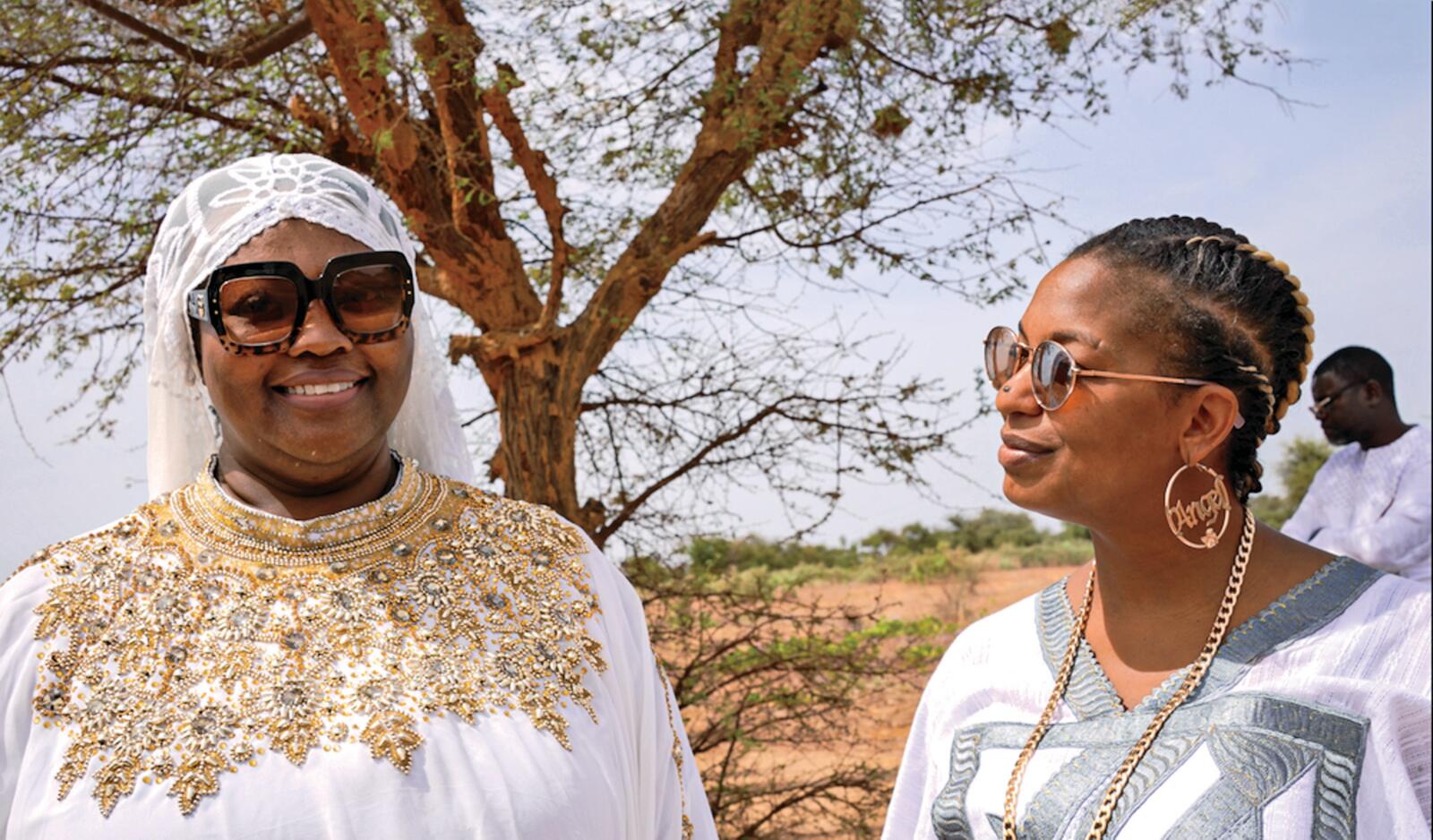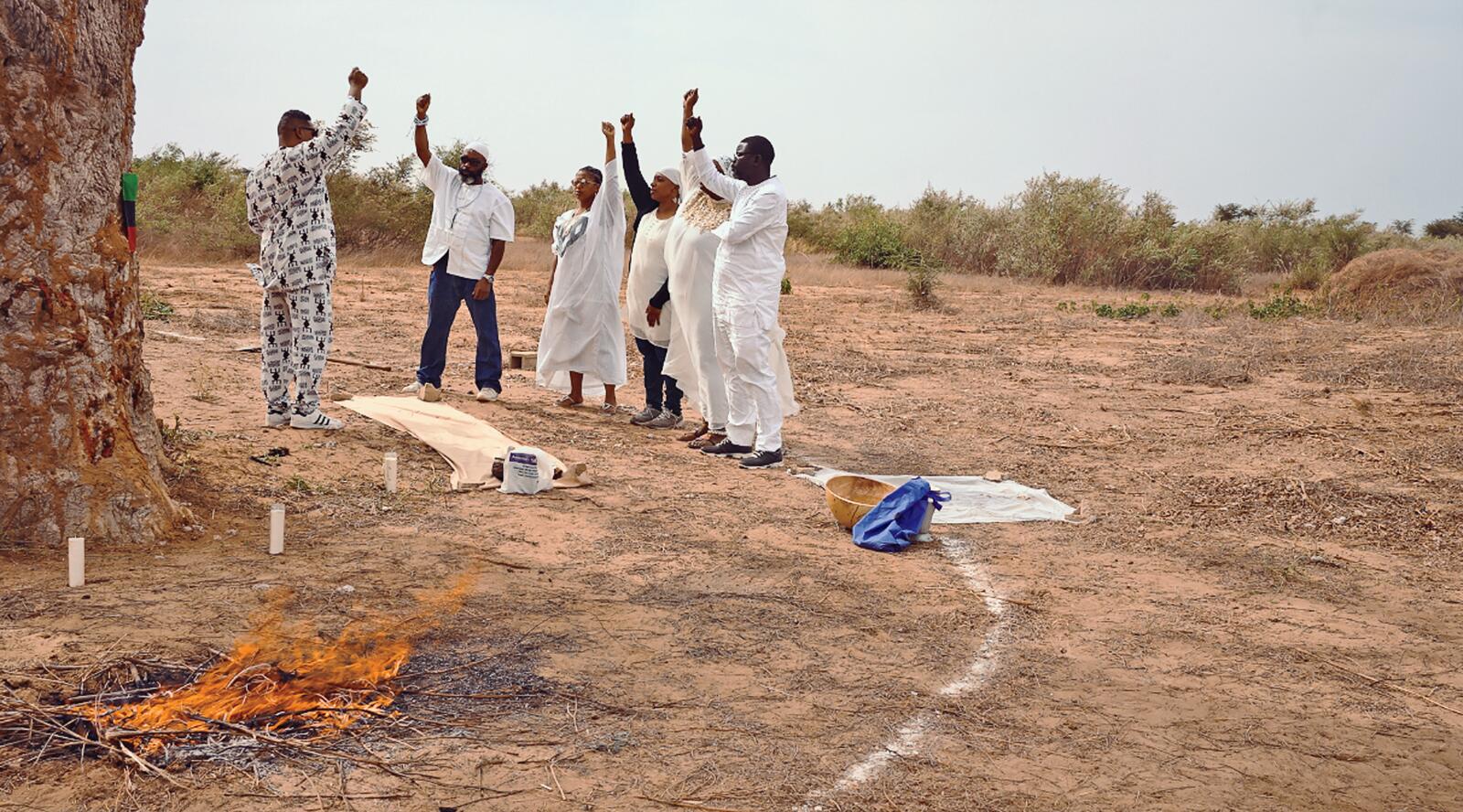
On a breezy Thursday evening, Queen Shaydonna “Queen Shay” Haynesworth and her friend Mia “Gigi” Davis are eating a delicious meal of thiébou guinaar (“rice with chicken,” in Senegal’s Wolof language) at the dining table in their home in Toubab Dialaw, a quiet beach town in Senegal. As they enjoy dinner on their patio, joined by Davis’s boyfriend and Haynesworth’s fiancé, they can hear birds merrily chirping. From the charming house on a ledge right above the beach, the group watches the sun set over the -Atlantic. It is casting a gorgeous orange glow across the sky, and the scene is picture-perfect. The flowers. The ocean. Their lovers. Senegal.
Having left the United States a few years ago, the two women smile at each other—knowing that it took hope and the strength of their growing friendship to build a life for themselves in West Africa. To forge connections in their adopted home, Haynesworth created a support group called the Circle, for Black Americans in Senegal.

Settling in to their new lives also meant activating their faith and spirituality. “I manifested this house,” Davis says— describing how, after arriving in Senegal, she engaged in hours of meditation, visualizing where she wanted to live. Several months later, the once-in-a-lifetime opportunity to rent the villa she currently shares with Haynesworth presented itself.
Now, the two women wake up each morning in their dream home. Each day is full of excitement and wonder, and they are grateful to have each other as they continue to live their best lives on the continent. “This is home; I am home,” Haynesworth says. But the journey to get there was a long one, full of twists and turns, sorrows and joys.
A Long Journey Home
When Haynesworth got off the plane and planted her feet in Senegal, she was flooded with emotions. “I was crying. I couldn’t even get it together,” she recalls. “From the airport- security agents to the border control to the person who stamped my passport to let me into the country, they all said ‘Welcome home.’”
The Virginia native had come to Senegal after her divorce. Relocating at age 40 was a leap of faith. Though she had worked in health insurance back in the States, in Senegal she joined forces with a friend to open a multistory guest home in the country’s capital city of Dakar; they called the boutique apartment community Sankofa Arms. But she soon faced the challenges of doing business in a foreign country. In Senegal, the two most-spoken languages are Wolof and French. Haynesworth speaks neither. Besides her difficulty -communicating, she faced hurdles as an unmarried, female business owner—in a highly patriarchal, predominantly Islamic society.
When her friend and business partner returned to America, she found herself struggling to manage the apartment building alone. She finally admitted she couldn’t cope, and she shut the guest home down. Her stress mounting, Haynesworth looked for other ways to make a living in Senegal. One day in 2022, she went for a medical checkup and was told that her blood pressure was at stroke level. After a mammogram, Haynesworth found out she had four tumors in her breasts. Her life felt like it was caving in.
That’s when she reached out to her friend Gigi Davis for support. Davis had just acquired a beautiful villa along the beach, the one the two women now call home. She encouraged Queen Shay to come and rest—so she did. Every day, she sat in front of the ocean to heal her body and her past. During this process, Davis was there to listen and provide comfort.
Davis, too, was on a journey of personal restoration—after the trauma of growing up in the fast lane in her hometown of Evansville, Indiana. “I grew up in the ’hood,” she explains. “I came to Africa to find myself.”
Haynesworth founded the Circle to network with other Black Americans who were living in -Senegal. The group, whose mission is to help its members explore investment opportunities that can allow them to thrive, participated in a 2023 Juneteenth cookout arranged by U.S. Embassy staff—some traditions from the past have -evidently remained a part of their lives in the Motherland.

More Black Women Make “the Return”
The last decade has seen a marked increase of Black Americans relocating to Africa. Some seek business opportunities. Others aim to connect with their ancestors, or to raise their families in a place where police brutality and racial discrimination aren’t persistent threats. Some were inspired by the government of Ghana’s highly publicized 2019 Year of Return campaign—supported by the NAACP and numerous Black celebrities, from Steve Harvey to Tina Knowles.
Shanda Lewis and her friend Ulonda Snell, close friends for more than two decades, followed this return movement to West Africa and decided to relocate to Senegal. Though they are not connected to the Circle, they forged a sisterhood in unfamiliar territory.
“After COVID-19, America was a mess,” Lewis states in her melodious New Orleans accent. The pandemic hit her hard financially—yet she never imagined leaving the U.S. As her mother’s only daughter, she felt compelled to stay close to her as she aged. However, in 2017, she started having powerful visions of being somewhere in Africa. “God told me I need to move to Africa for my protection and safety,” Lewis says. She told Snell about the visions.
Lewis watched dozens of YouTube videos about -African-Americans relocating to Africa. One day, she came across a video featuring an American man discussing his Senegal- -relocation service—and she and Snell decided to use it. They packed their suitcases and booked flights to Dakar. When the two women arrived, they could hardly contain their excitement. But challenges confronted them at different stages of their journey.
To start, the women’s accommodations upon their arrival were moldy and run down. And like Haynesworth, Snell was stifled by the language barrier. She also had to overcome obstacles similar to those Haynesworth had faced while investing in a business. Fortunately, she and Lewis had each other.
“It was our friendship that helped me to get through it,” Snell says of Lewis—acknowledging that she could have returned to her cozy life in her Miami hometown, where her mother was still hoping that her daughter was in a temporary “Africa phase.” But this is not just a phase for Snell. She plans to remain in Africa for the rest of her life.
Hearing the Ancestors’ Call
For all these women, honoring their ancestors is important. Davis’s sister was murdered in 2021, and Davis is among those who venerate their late family members in front of a baobab tree that has become their ancestral tree.
As they look to the past, they also continue to be encouraged by the future. In 2023, Snell and Lewis found a new apartment in Dakar; and Snell’s educational consultancy firm is steadily gaining clients. After 22 years of working as a hairdresser in America, Lewis put down her shears and now teaches English at two schools in Senegal. Haynesworth’s new company, the Queen Within Experience, offers spiritual-healing retreats and small-group trips for Black women visiting Senegal and Gambia. Meanwhile, Davis is helping Africans access affordable solar energy—while operating a retail store in Dakar, where she sells popular American products. With gratitude, all four women realize it was their sisterhood that brought them this far, and they have faith it will continue to guide them.
Photography by Chika Oduah